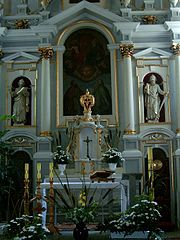
A History Of The Mass And Its Ceremonies In The Eastern And Western Church -Rev John O'Brien A.M.
THE GOSPEL OF ST. JOHN
After the priest has imparted his blessing he turns to the Gospel corner of the altar, and there, standing with his face a little turned towards the people, as at the first Gospel, reads the “In principio,” or Gospel of St. John. He kneels so as to touch the ground at the words “et Verbum caro factum est”—“And the Word was made flesh”—to remind us of the profound humility of our Lord in becoming man for our sake.
At the end of the Gospel the server answers, “Deo gratias,” and the Mass is ended. The priest then takes the chalice with him into the sacristy, and, having unrobed himself, remains some moments in acts of thanksgiving and prayer.
History of the Gospel of St. John.—From the surpassing sublimity of this Gospel many ancient philosophers used to say that it ought to be written in letters of gold and conspicuously hung up in every church, in order that all might be able to see it (Bona, p. 373). From the remotest days of Christianity it has been held in the deepest veneration by all classes of people, and many pious Catholics now, as well as of old, carry their reverence for it so far as to wear it on their persons. But it has not been always a part of the Mass. Up to the time of Pope Pius V. a priest could say it or omit it, just as he pleased, for it was then only a private prayer, just like the “Benedicite.” This holy Pontiff, however, finding how very much attached the people were to it, inserted it in the missal which was drawn up by his orders, and so made its recital obligatory on all, with certain special exceptions. The bishop does not recite it at the altar in Solemn High Mass, but only on the way back to his throne, and it is never recited by the Carthusians, Cistercians, the monks of Monte Casino, or those of Cluny. At Lyons it is recited by the priest on his way back from the altar, and at Clermont it is said at the sacristy door (Romsee, p. 341). It has no place in the Mass of the Orientals, nor is it customary to say it in the Pope’s Chapel at Rome.
Copyright ©1999-2023 Wildfire Fellowship, Inc all rights reserved

 Keep Site Running
Keep Site Running